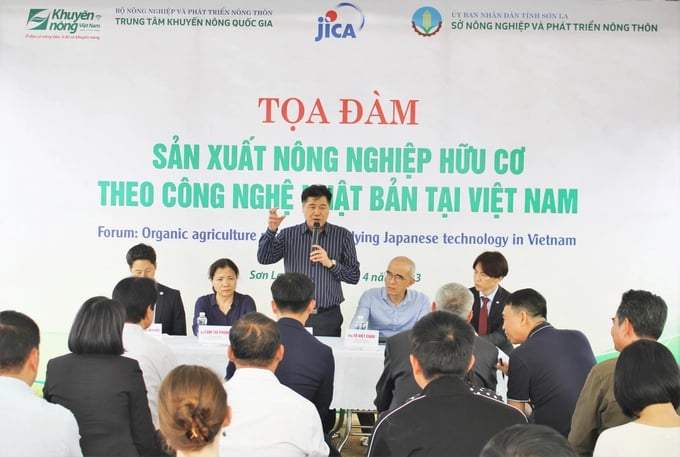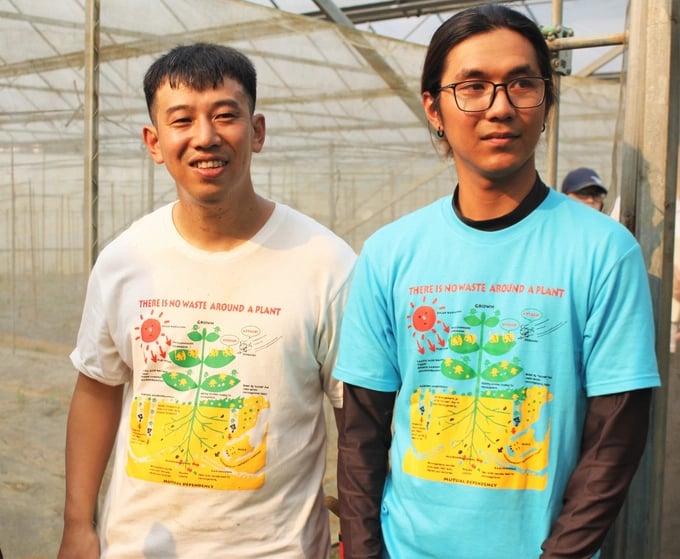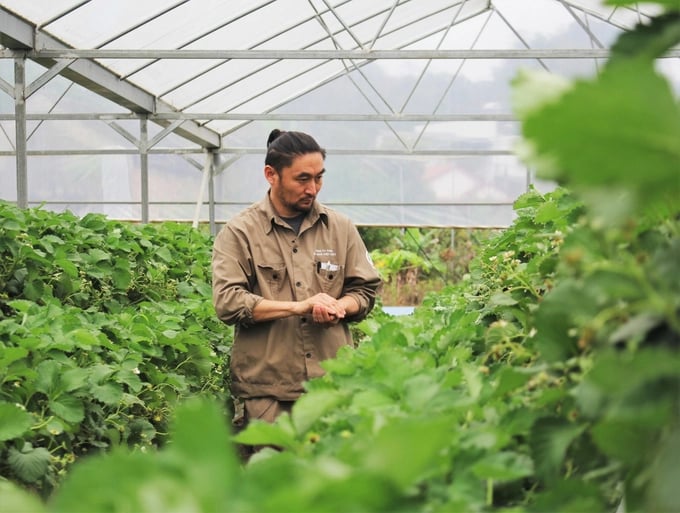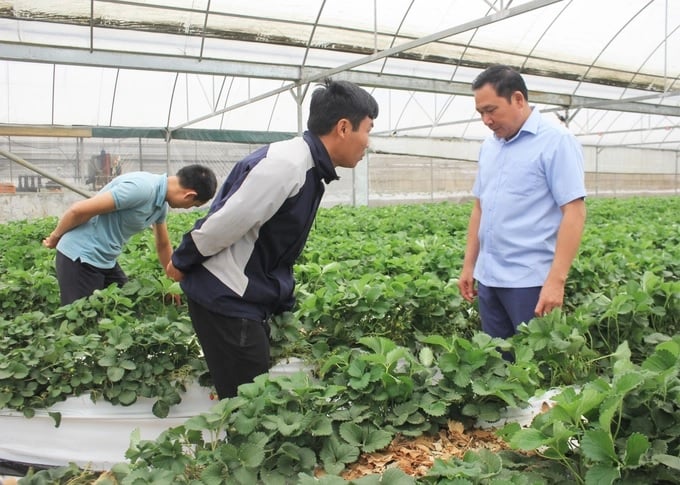June 18, 2025 | 19:43 GMT +7
June 18, 2025 | 19:43 GMT +7
Hotline: 0913.378.918
June 18, 2025 | 19:43 GMT +7
Hotline: 0913.378.918

Delegates shared experiences in safe agricultural production at the forum on Organic Agriculture Production applying to Japanese technology in Vietnam. Photo: Hai Dang.
The National Agricultural Extension Center (NAEC) has just coordinated with the Department of International Cooperation (MARD) and Japan International Cooperation Agency (JICA) to organize a forum on "Organic agricultural production applying Japanese technologies in Vietnam" in Son La province.
This is an event in the series of activities of the Project for Strengthening Safe Crop Value Chains in Northern Vietnam funded by the Government of Japan through the Japanese Ministry of Agriculture, Forestry and Fisheries, JICA deployed. The Ministry of Agriculture and Rural Development of Vietnam has assigned the National Agricultural Extension Center to lead the project implementation.
The delegates visited the closed green tea and matcha tea production chain at the Japanese tea factory of Satoen Vietnam Co., Ltd. (Sao Do 2 sub-area, Van Ho commune, Van Ho district). It is the first high-quality Japanese tea and matcha tea factory outside Japan.
The production process is closed with modern and high-tech equipment. The company has used a net to keep the tea leaves fresh and green to make matcha tea (a method that few units use). All products will be thoroughly checked for quality at the Satoen Institute of Food and Drugs and the National Institute of Food Safety and Hygiene.
The company also has a processing factory in the center of the tea garden with a green tea production line with a 2 tons/day capacity, producing matcha tea with 2.5 tons of raw materials/day. The young tea buds, after being harvested, are immediately put into processing to help retain the characteristic flavor of Japanese tea.
According to Mr. Sato Kimihico, President of Satoen Vietnam, organizing production in a closed chain will facilitate control of the entire process from production to processing and consumption of products. With the application of modern technology, advanced farming methods also becomes more accessible.

Mr. Le Quoc Thanh, Director of the National Agricultural Extension Center (2nd from left) and JICA Vietnam representative visited the Japanese tea ingredients production area of Satoen Vietnam Co., Ltd. Photo: Hai Dang.
At Nico Nico Yasai organic vegetable farm in Van Ho town (Son La), the visiting delegates were impressed with the enthusiasm and philosophy of agricultural farming "there is no waste around a plant" of the Shiokawa Minoru (Japan) and Nguyen Phuoc Sinh (from Buon Ma Thuot, Dak Lak).
Farm owner Shiokawa Minoru shared: The organic vegetable farm in Van Ho has an area of more than 2,500m2, designed into greenhouses, net houses to grow tomatoes, potatoes, bell peppers, and onions.
Nico Nico Yasai's motto is "Agricultural production must respect nature, prepare nutritional sources and create the best products with special value". Therefore, in the production process, the farm always appreciates all agricultural wastes, turning them into the best source of nutrients for plants.
According to Mr. Shiokawa Minoru, all inputs, such as seeds, irrigation water, and fertilizers must be strictly controlled to produce organic vegetables. The farming process must be done manually; absolutely "say no" to pesticides and chemical fertilizers.

The agricultural philosophy of "there is no waste around a plant" of Shiokawa Minoru and Nguyen Phuoc Sinh at Nico Nico Yasai organic vegetable farm. Photo: Hai Dang.
At the strawberry production farm of Viet Nhat Fruit and Vegetable Company in Bua village, Dong Sang commune (Moc Chau), Mr. Nahana Shojiro, the Company's Director, shared his experiences in safe and economic strawberry farming.
According to Mr. Nahana Shojiro, to create quality and safe strawberry products and save production costs, every step in the production process must be done carefully. On average, strawberry plants can be harvested for up to 6 years. However, the highest yields usually fall in the first and second years. Therefore, if you can maintain the replacement of seedlings once a year, the result will be optimal.

Mr. Nahana Shojiro's western strawberry farm has succeeded by applying advanced farming techniques. Photo: Hai Dang.
Regarding care, strawberry is a very susceptible plant to many diseases. Anthracnose is a complex disease to treat and can cause mass death. To completely solve this disease, the farm has built each closed tank, leaving only a single outlet for water. Then, use rice bran to mix with the soil, pump it with water, and cover the surface with plastic to limit air and keep the temperature (always maintain the temperature from 30 - 50 degrees Celsius). Soak the soil for at least one month to kill all pathogens before sowing.
According to Mr. Nahana Shojiro, this method is quite expensive, but the effect is good, as evidenced by the fact that in the past two years, his farm has no longer had the phenomenon of dead trees due to anthracnose disease.
In the process of caring, he used rotted rice husks with probiotics to fertilize instead of using chemical fertilizers to increase soil nutrition. With this method, the strawberry areas of the company grew and developed very well. Each year, the company sells about 14 tons of strawberries. Products are sold out right after they are produced.

Safe agricultural practices on Japanese farms have inspired many Vietnamese cooperatives. Photo: Hai Dang.
According to Mr. Le Quoc Thanh, Director of the National Center for Agricultural Extension, the project "Strengthening the safe crop value chain for the northern provinces of Vietnam" has many innovations in terms of design, which is the value chain construction approach. The actors involved in the chain are cooperatives and agricultural extension systems.
In addition to capacity building for cooperatives, the project also enhances the capacity of agricultural extension officers and stakeholders in the safe crop value chain. This is a sustainable approach to training high-quality human resources with specialized knowledge and skills necessary to strengthen enforcement capacity to ensure food safety.
Translated by Ha Phuc
/2025/06/17/3942-2-143243_548.jpg)
(VAN) Recently, in Sweden, the Secretary of the Binh Dinh Provincial Party Committee presented the Investment Registration Certificate for the 'Polyester Fabric Recycling Complex' project to SYRE Impact-AB Company.
/2025/06/12/3721-2-202745_83.jpg)
(VAN) TH made an impression at Seoul Food 2025 with its line of natural beverages, paving the way for Vietnamese food products to enter the South Korean market.

(VAN) Soc Trang's success in rice exports stems from a strategy of developing fragrant and specialty rice cultivation areas and standardizing production toward low-emission practices.
/2025/06/11/1311-5-120811_839.jpg)
(VAN) The pig farming industry is facing the challenge of comprehensive restructuring to meet requirements for quality, safety, traceability, and market expansion both domestically and for export.

(VAN) Vietnam considers participating in ALGROALBA in order to expand agricultural production, coordinate the assessment and effective exploitation potential land.
/2025/06/05/5314-1-184727_407.jpg)
(VAN) From seemingly worthless fish scales and skin, enzymes and lactic ferments can transform by-products into peptides, opening a sustainable, effective business direction and elevating Vietnamese seafood.

(VAN) TTC AgriS and IFC signed a strategic partnership to develop a sustainable agricultural value chain, aiming to achieve the Net Zero target by 2035.